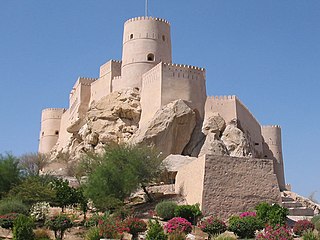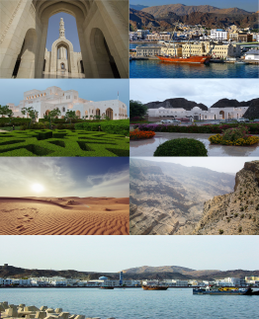 |
|---|
| This article is part of a series on the politics and government of Oman |
|
| Cabinet |
Administrative divisions |
General elections were held in Oman on 16 October 1997. [1]
 |
|---|
| This article is part of a series on the politics and government of Oman |
|
| Cabinet |
Administrative divisions |
General elections were held in Oman on 16 October 1997. [1]
The 82 members of the Consultative Assembly were selected in a two-stage process. Elections were held in 60 constituencies (based on the wilayahs); in 38 constituencies two members were elected, of which Sultan Qaboos chose one to sit in the Assembly, whilst in the remaining 22 constituencies four members were elected, of which the Sultan chose two.
Only around 51,000 people were eligible to vote, [2] with voters chosen by tribal leaders. [3]
A total of 736 candidates contested the elections. [1]
The two incumbent female MPs (Shakour bint Mohammed al-Ghamari in Muscat and Taiba al-Mawali in Seeb) were both re-elected. [1]

Oman, officially the Sultanate of Oman, is a country on the southeastern coast of the Arabian Peninsula in Western Asia and the oldest independent state in the Arab world. Located in a strategically important position at the mouth of the Persian Gulf, the country shares land borders with the United Arab Emirates to the northwest, Saudi Arabia to the west, and Yemen to the southwest, and shares marine borders with Iran and Pakistan. The coast is formed by the Arabian Sea on the southeast and the Gulf of Oman on the northeast. The Madha and Musandam exclaves are surrounded by the UAE on their land borders, with the Strait of Hormuz and the Gulf of Oman forming Musandam's coastal boundaries.

Oman is the site of pre-historic human habitation, stretching back over 100,000 years. The region was impacted by powerful invaders, including other Arab tribes, Portugal and Britain. Oman once possessed the island of Zanzibar, on the east coast of Africa as a colony.

The Politics of Oman take place in a framework of an absolute monarchy. The Sultan of Oman is not only the head of state, but also the head of government. The head of state and government is the hereditary sultan, who appoints a cabinet to assist him. The sultan also serves as the supreme commander of the armed forces, prime minister, defense minister, finance minister and foreign affairs minister.

Muscat is the capital and is the most populated city in Oman. It is the seat of the Governorate of Muscat. According to the National Centre for Statistics and Information (NCSI), the total population of Muscat Governorate was 1.4 million as of September 2018. The metropolitan area spans approximately 3,500 km2 (1,400 sq mi) and includes six provinces called wilayat. Known since the early 1st century CE as an important trading port between the west and the east, Muscat was ruled by various indigenous tribes as well as foreign powers such as the Persians, the Portuguese Empire, the Iberian Union and the Ottoman Empire at various points in its history. A regional military power in the 18th century, Muscat's influence extended as far as East Africa and Zanzibar. As an important port-town in the Gulf of Oman, Muscat attracted foreign tradesmen and settlers such as the Persians and the Balochis. Since the ascension of Qaboos bin Said as Sultan of Oman in 1970, Muscat has experienced rapid infrastructural development that has led to the growth of a vibrant economy and a multi-ethnic society. Muscat is termed as a Beta - Global City by the Globalization and World Cities Research Network.

Said bin Taimur was the 13th Sultan of Muscat and Oman from 10 February 1932 until he was deposed on 23 July 1970 by his son Qaboos bin Said.

Qaboos bin Said Al Said was the Sultan of Oman from 23 July 1970 until his death. A fifteenth-generation descendant of the founder of the House of Al Said, he was the longest-serving leader in the Middle East and Arab world at the time of his death.

The Sultanate of Muscat and Oman was a state that encompassed the present-day Sultanate of Oman and parts of present-day United Arab Emirates and Gwadar, Pakistan. Muscat courts' verdicts were based on Ibadi Islamic sharia law and appeals were raised to the Sultan of Muscat, who exercised supreme ruling.

The Consultative Assembly is the lower house of the Council of Oman. It is the only legislative body in Oman of which all members are democratically elected. The other chamber of the parliament is the Council of State.

Oman is an absolute monarchy in which all legislative, executive, and judiciary power ultimately rests in the hands of the hereditary sultan, and in which the system of laws is based firmly on Islamic sharia. Although a report by the U.S. State Department, based on conditions in 2010, summed up the human rights situation in the country by asserting that the government “generally respected the human rights of its citizens,” the details in the report itself strongly indicate otherwise, and several international human-rights groups have described the state of human rights in Oman in highly critical terms. According to a report, on 20 December 2015, poet and television producer Nasser al-Badri was summoned by the Police Special Section and detained for 12 days without charge and without trial. The report added that the Omani Observatory for Human Rights said that al-Badri was detained because of tweets he posted criticising Sultan Qaboos and the state of the country’s economy. Article 41 of Oman’s statute (constitution) criminalizes any criticism of the sultan, stating that the sultan’s ‘person is inviolable and must be respected and his orders must be obeyed’.

General elections was held in Oman on 15 October 2011 to choose 84-members of the Consultative Assembly.

The 2011 Omani protests were a series of protests in the Persian Gulf country of Oman that occurred as part of the revolutionary wave popularly known as the "Arab Spring".

Women in Oman now pursue careers and professional training, moving from their previous and traditional role at home to the public sphere. In Oman, 17 October is celebrated every year as the Omani Women's Day with various pro-female events.

The Council of Oman is a bicameral parliament, made up of the members of the State Council and the Consultation Council, as stipulated in Article 58 of the Basic Law of the State. It is considered to be the main Parliament in Oman. It assists the government in drawing up the general policies of the state. The Council meets at the request of the sultan to study and discuss matters raised by him, taking all its decisions on the basis of a majority vote. The sultan addresses all the members of this council on an annual basis. There are 15 women members among the 167 members of the parliament.

General elections were held in Oman on 14 September 2000. They were the first direct elections in the country's history.

General elections were held in Oman for the first time in 1991.

General elections were held in Oman in 1994. They were the first elections in a Gulf Arab country in which women could both vote and stand as a candidate.

The Royal Office transliterated:maktab al sultani is one of the most senior and therefore powerful ministries in the Sultanate of Oman. It is a government body that has most influence in national security and intelligence issues and the minister in charge has been the de facto national security advisor to the Sultan. The Palace Office also acts as a foreign liaison focus on all international intelligence and security matters.
Shakour bint Mohammed al-Ghamari is an Omani politician. In 1994, she and Taiba al-Mawali were indirectly elected to the Consultative Assembly, becoming the first women in the Parliament of Oman.
Taiba bint Mohammad al-Mawali is an Omani politician. In 1994, she and Shakour bint Mohammed al-Ghamari were indirectly elected to the Consultative Assembly, becoming the first women in the Parliament of Oman.